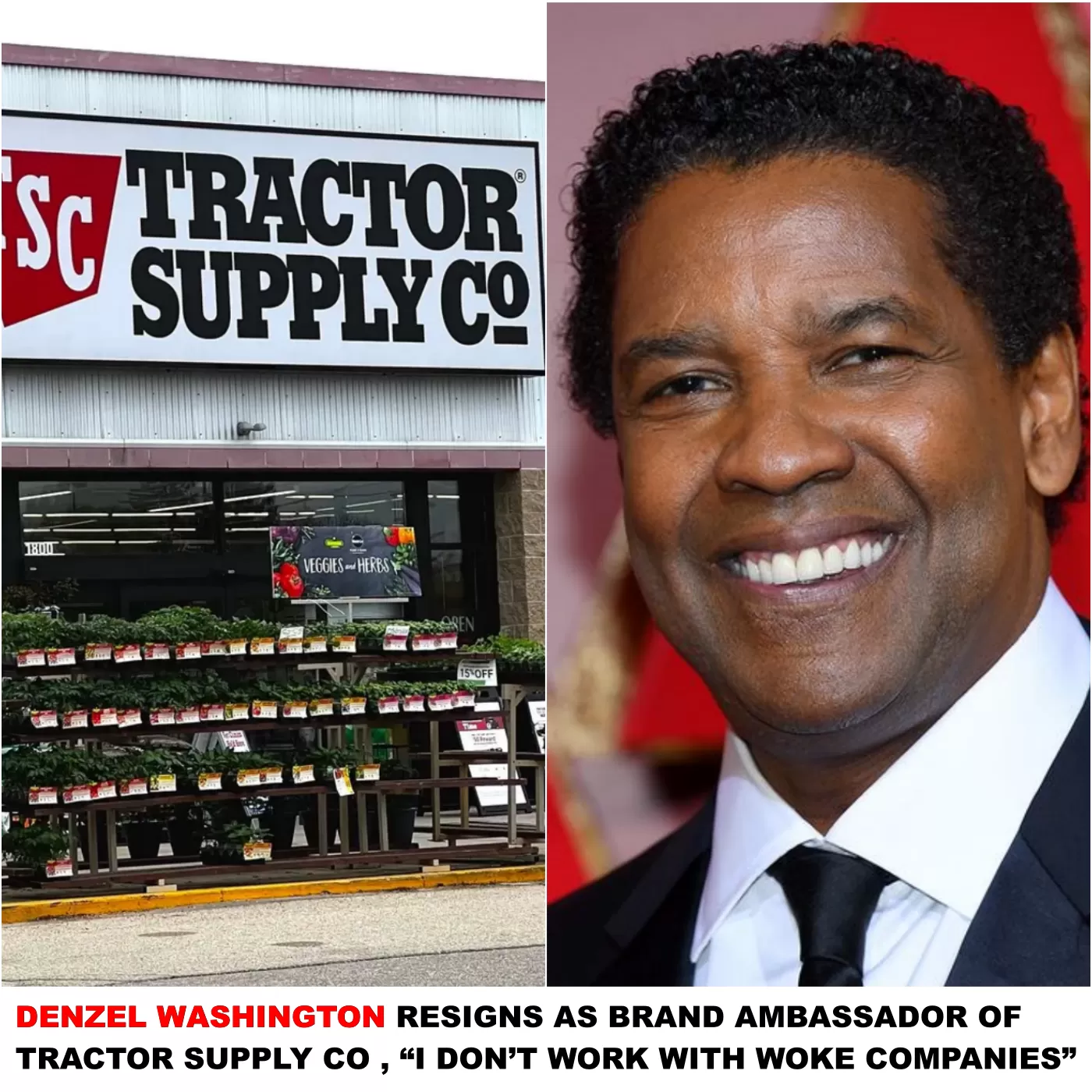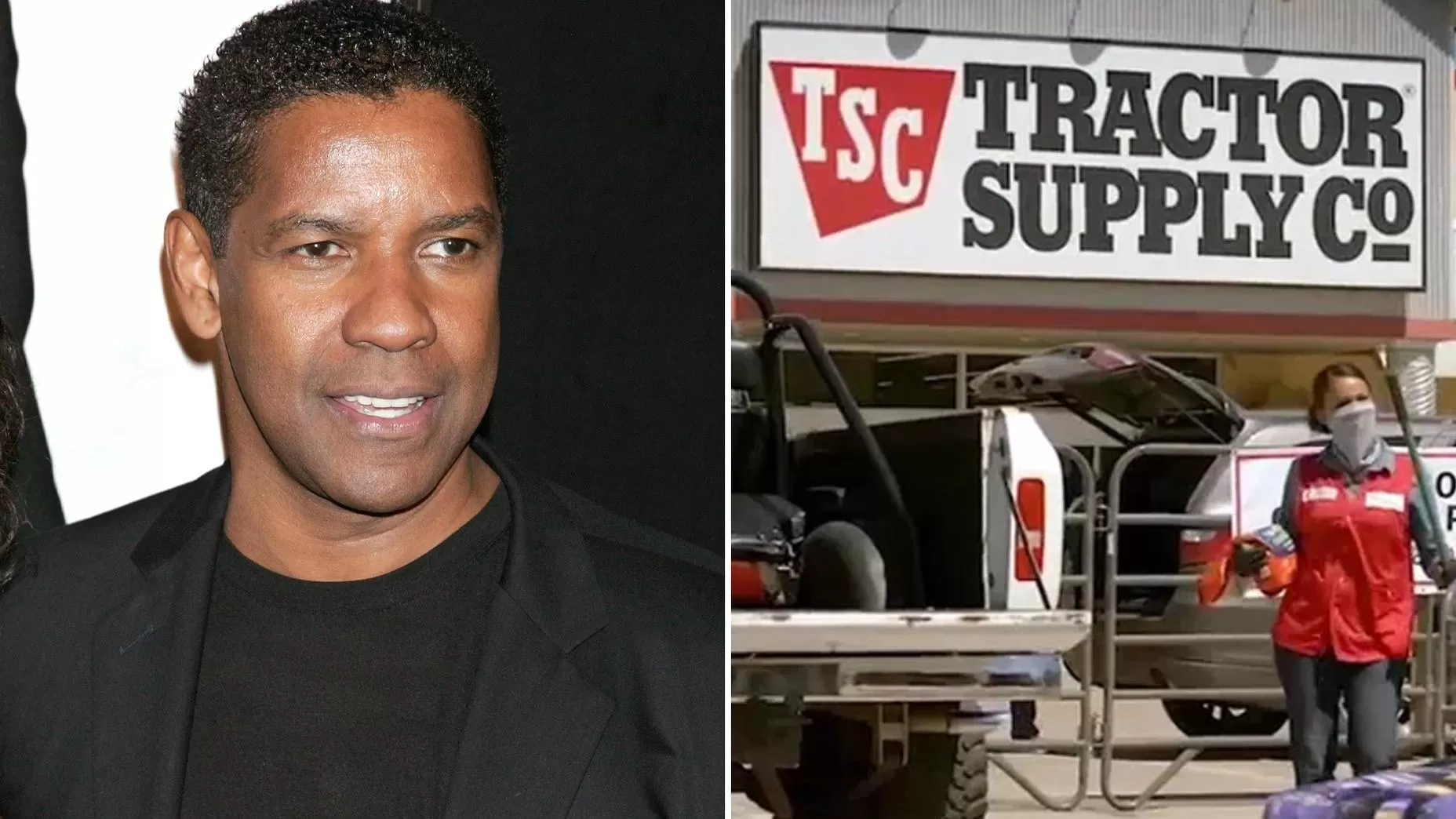In a surprising move that has sent shockwaves through the entertainment and corporate worlds, acclaimed actor Denzel Washington has announced his resignation as the brand ambassador of Tractor Supply Co., citing a strong stance against what he describes as the company’s “woke” policies. This decision has ignited a heated debate on the role of politics and social values in business, further polarizing opinions on corporate social responsibility.

Denzel Washington, known for his powerful performances and commanding screen presence, has been a beloved figure in Hollywood for decades. His association with Tractor Supply Co., a leading supplier of farming and rural lifestyle products, began as part of the company’s effort to appeal to a broader audience while maintaining its core customer base. Washington’s down-to-earth persona and widespread appeal made him an ideal spokesperson.
However, in a recent statement, Washington declared his departure from this role, saying, “I don’t work with woke companies.” This announcement came as a shock to many, as Washington had been a visible and effective ambassador for Tractor Supply Co., appearing in numerous advertisements and promotional materials that emphasized the brand’s commitment to quality and community.
Tractor Supply Co., founded in 1938, has long been a staple in rural America, providing a wide range of products for farmers, ranchers, and rural residents. Over the years, the company has built a reputation for reliability and service, fostering a loyal customer base. Recently, however, Tractor Supply Co. has embarked on a series of initiatives aimed at promoting diversity, equity, and inclusion (DEI). These initiatives include supporting various social justice causes, featuring more diverse groups in their advertisements, and adopting more inclusive language and imagery.
While these changes have been praised by some as necessary steps towards modernization and social responsibility, they have also faced backlash from customers and stakeholders who feel the company is straying from its roots. Washington’s resignation highlights this tension, bringing to the forefront the broader cultural divide that exists within both the corporate and consumer landscapes.
In his statement, Washington elaborated on his reasons for stepping down. “I have always stood by my principles and values, and I believe in hard work, integrity, and authenticity. While I support efforts to promote equality and justice, I cannot align myself with a company that I feel is more focused on performative activism than genuine change.”
Washington’s comments reflect a growing sentiment among some public figures and consumers who are skeptical of corporate efforts that they perceive as pandering to social trends without making substantial or meaningful changes. This perspective suggests a preference for actions that align more closely with traditional values and a belief in the importance of authenticity over what is seen as performative virtue signaling.
The public reaction to Washington’s resignation has been mixed, mirroring the broader societal divide on these issues. Supporters of Washington’s decision praise him for standing by his principles and refusing to be associated with what they view as superficial corporate activism. “Denzel Washington is a man of integrity,” tweeted one supporter. “It’s refreshing to see someone in Hollywood who isn’t afraid to stand up for what they believe in.”
Conversely, critics argue that Washington’s stance is a setback for progress and inclusivity. “By rejecting Tractor Supply Co.’s efforts to be more inclusive, Denzel Washington is sending a message that change and progress are not welcome,” commented another social media user. “We need more companies to take these steps, not fewer.”
The media coverage of this incident has further amplified these debates, with various outlets providing different perspectives on the implications of Washington’s resignation. Some frame it as a courageous stand against what they see as empty corporate gestures, while others view it as a troubling sign of resistance to necessary social progress.
The impact of Washington’s resignation on Tractor Supply Co. is significant. As a high-profile brand ambassador, Washington’s association with the company brought considerable visibility and credibility. His departure could potentially affect the company’s public image and its efforts to navigate the complexities of modern corporate social responsibility.
Tractor Supply Co. released a statement expressing disappointment at Washington’s decision but reaffirming their commitment to their DEI initiatives. “We respect Denzel Washington’s decision and appreciate his contributions to our brand. Our commitment to diversity, equity, and inclusion remains steadfast as we believe these principles are essential for our long-term success and the well-being of our community.”
Washington’s resignation can be seen within the broader context of the ongoing cultural wars that have intensified in recent years. Terms like “woke” have become flashpoints in debates about social justice, inclusivity, and corporate responsibility. For some, “wokeness” signifies a necessary and progressive shift towards addressing historical inequalities and fostering inclusivity. For others, it represents an overreach that politicizes corporate policies and alienates traditional values.
The clash between these perspectives highlights the challenges businesses face in trying to appeal to a diverse and often polarized customer base. Companies are increasingly finding themselves in the crosshairs of cultural debates, with their policies and public statements scrutinized by supporters and detractors alike.
As Tractor Supply Co. moves forward without Washington as their brand ambassador, the company faces the challenge of maintaining its commitment to social responsibility while addressing the concerns of its traditional customer base. This may involve more transparent communication about the goals and impacts of their DEI initiatives, as well as efforts to ensure that these initiatives are seen as genuine and substantive.
For Denzel Washington, this decision reaffirms his commitment to his personal values and principles. It also positions him as a figure willing to take a stand against what he perceives as superficial corporate practices, further solidifying his reputation as an actor and public figure of integrity.
Denzel Washington’s resignation as brand ambassador of Tractor Supply Co. has sparked a significant debate about the role of politics and social values in business. While some view his decision as a principled stand against performative corporate activism, others see it as a setback for inclusivity and progress.
As the cultural landscape continues to evolve, businesses and public figures will need to navigate these complex issues with care and consideration. The incident underscores the importance of authenticity and the need for genuine efforts to promote social change, highlighting the delicate balance between maintaining traditional values and embracing modern social responsibilities.




